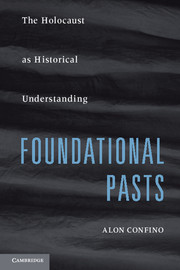Preface
Published online by Cambridge University Press: 05 June 2012
Summary
Foundational Pasts works on two levels: one presents a specific interpretive argument about the Holocaust, whereas the other advances several claims about historical reconstruction. The two levels are connected, but each also makes arguments that stand independently. My intention is that readers will read this rather short text in one sitting and with minimal interruptions; I have therefore kept endnotes to a minimum. The aim is to be suggestive, not comprehensive. I hope that readers will take different things from this book depending on their interests and inclinations and, whether or not they agree with some of the arguments, will find it good to think with. I do not see the book as a package deal, a sort of hermetic argument that requires the reader either to accept or to reject it. It has several faces. Scholars of the Holocaust may read it somewhat differently than do other scholars. But it does invite each historian to probe his or her ways of reconstructing the past.
In different ways, this book has been on my mind for a long time. I first thought about the associations between the French Revolution and the Holocaust when I was a graduate student at the University of California at Berkeley. I then went on to write on other topics in German history, although the Holocaust was never far from my mind. Several years ago, when I began to have doubts about some of the tenets of Holocaust historiography, I wrote an essay on Nazi fantasies of Jews. From that starting point, the book simply wrote itself in an intense, short spell. I have since rewritten and revised it and, while doing so, incurred enormous debts to friends and colleagues who shared with me their wisdom, knowledge, and time.
Information
- Type
- Chapter
- Information
- Foundational PastsThe Holocaust as Historical Understanding, pp. ix - xiiPublisher: Cambridge University PressPrint publication year: 2011
